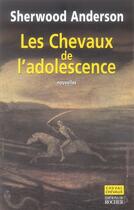-
Nombre de pages : (-)
-
Collection :
(-)
-
Genre :
(-)
-
Thème :
Non attribué
-
Prix littéraire(s) :
(-)
Résumé:
In the winter of 1912, Sherwood Anderson (18761941) abruptly left his office and spent three days wandering through the Ohio countryside, a victim of nervous exhaustion. Over the next few years, abandoning his family and his business, he resolved to become a writer. Novels and poetry followed,... Voir plus
In the winter of 1912, Sherwood Anderson (18761941) abruptly left his office and spent three days wandering through the Ohio countryside, a victim of nervous exhaustion. Over the next few years, abandoning his family and his business, he resolved to become a writer. Novels and poetry followed, but it was with the story collection Winesburg, Ohio that he found his ideal form, remaking the American short story for the modern era. Hart Crane, one of the first to recognize Andersons genius, quickly hailed his accomplishment: America should read this book on her knees. Herefor the first time in a single volumeare all the collections Anderson published during his lifetime: Winesburg, Ohio (1919), The Triumph of the Egg (1921), Horses and Men (1923), and Death in the Woods (1933), along with a generous selection of stories left uncollected or unpublished at his death. Exploring the hidden recesses of small town life, these haunting, understated, often sexually frank stories pivot on seemingly quiet moments when lives change, futures are recast, and pasts come to reckon. They transformed the tone of American storytelling, inspiring writers like Hemingway, Faulkner, and Mailer, and defining a tradition of midwestern fiction that includes Charles Baxter, editor of this volume.
Donner votre avis















